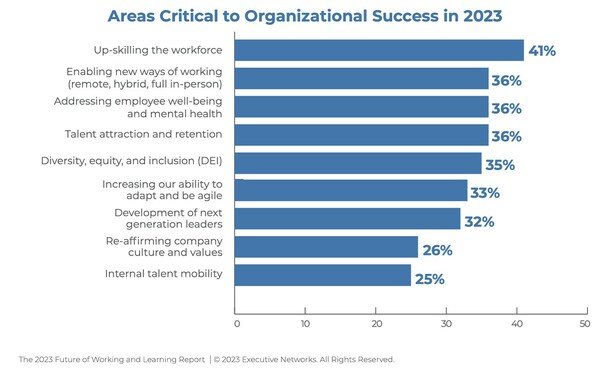About half (46%) of knowledge workers report that their companies are not doing anything to make it worthwhile to commute to the office, “The 2023 Future of Working and Learning Report” released today by Executive Networks found. A majority of senior HR leaders (71%) and senior business leaders (62%) agree that there’s likely a “proximity bias” against remote/hybrid workers, making it difficult for those working off-site to get ahead.
“Companies are offering more perks and increasing compensation to entice workers back to the office. But they need make coming to the office more purposeful and “commute worthy”. This will require employers to be clear on why and how working in the office can optimize collaboration and innovation,” said Jeanne Meister, Executive VP, Executive Networks. “Employers also need to provide equal opportunity for advancement and development, no matter where the work gets done.”
In addition to making the office “commute worthy”, employers need to explore flexibility options desired by workers. This research found the most desired flexibility option is access to a 4-day or 32-hour work week with no pay reduction. This is desired by 69% of knowledge workers and 56% of front-line workers, but is currently only offered to 16% and 29%, respectively.
Investments in Skills-based Learning for Recruitment and Retention
Upskilling tops the list of what’s most critical for organizations. Four in ten respondents (41%) ranked upskilling the workforce as vital for their organization’s success in 2023, followed by enabling new ways of working (36%), supporting mental health (36%), and retaining talent (36%).
In fact, 80% of HR and business leaders believe investments made in skills-based training can be used as a recruitment and retention tool. And nearly half of knowledge workers (45%) and about a third of frontline workers (30%) believe people are leaving their company due to insufficient career advancement and development opportunities. Additionally, 36% of workers identified stress and burnout as a major factor in employees leaving their organization.
“Stress and burnout have long been documented as a reason employees leave their jobs, but the lack of opportunity to learn new things and grow in their careers is also a primary driver of employees wanting to make a change,” said Rita Vanhauwenhuyse, GM Europe, Executive Networks.
About This Research
Executive Networks’ Future of Working and Learning Report surveyed 1,301 HR leaders, business leaders, knowledge workers and frontline workers across North America, India, and Europe. This study was supported by research partner companies, meQuilibrium and University of Phoenix.






















